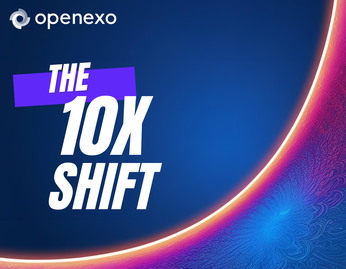
Global Impact: Unleashing the Power of Exponential Organizations
Key insights include impressive financial outcomes, the role of OpenExO, and actionable strategies for adopting ExO principles. Dive in to see how you can leverage exponential technologies for transformative success.
The journey of Exponential Organizations (ExOs) began in the heart of Silicon Valley, a place synonymous with innovation and disruptive growth. This transformative concept, which has reshaped the landscape of business, emerged from the observations of Salim Ismail at Singularity University. Ismail noticed tech companies achieving disproportionate impacts through new organizational models and accelerating technologies. This insight inspired a collaborative effort with Yuri van Geest, Michiel Schuurman, and Peter Diamandis, leading to the publication of "Exponential Organizations" in 2014. With over 600,000 copies sold in more than 20 languages, the book has ignited a global movement towards exponential growth and innovation.
An Exponential Organization (ExO) is defined as an organization whose impact is at least 10x larger than its peers, leveraging new organizational techniques and accelerating technologies. The authors analyzed 70 different business paradigms and over 200 "unicorns" to formulate the ExO model. The tangible results of implementing this model have been impressive:
- Profits that are nearly seven times higher
- Shareholder returns that are 40 times higher
- Asset turnover that is 11.7 times better
- Revenue growth that is 2.6 times better
An Exponential Organization (ExO) is one whose impact (or output) is disproportionally large—at least 10x larger—compared to its peers because of the use of new organizational techniques that leverage accelerating technologies.
The success of "Exponential Organizations" led to the establishment of OpenExO by Salim Ismail. This community, now comprising 24,000 consultants, entrepreneurs, innovators, and academics, supports companies in their transition to ExO models. OpenExO provides resources and fosters a collaborative environment, making Ismail a sought-after speaker for corporations, industry groups, and governments worldwide.
The impact of ExO principles has been rigorously analyzed in the context of the Fortune 100 companies over a seven-year period from 2014 to 2021. The top 10 companies most aligned with ExO attributes significantly outperformed the bottom 10 in key financial metrics:
- Revenue Growth: 2.6 times higher
- Profitability: 6.8 times higher
- Return on Assets: 11.7 times higher
- Total Shareholders Return (CAGR): 40 times higher
Over an eight-year period, of the largest 100 American corporations, the companies that most emulated the attributes of the ExO model delivered shareholder returns that were a staggering 40 times better than those of the companies that least followed the model.
The Exponential Quotient (ExQ) survey has been instrumental in identifying the top 100 most scalable and adaptable exponential organizations, known as the ExO Top 100. These organizations, assessed by a global group of ExO experts, have shown impressive financial results over an eight-year period:
- 80% generated positive shareholder returns
- 26% average annualized growth in valuation
- A 46.6x jump in valuation for startups and scale-ups
Abundance360, a leadership program run by Peter Diamandis, further emphasizes the importance of exponential technologies and transformative leadership. The program focuses on artificial intelligence, exponential technologies, Massive Transformative Purpose (MTP), Moonshots, longevity breakthroughs, and community building among exponential entrepreneurs.
Ten-times growth is eminently achievable to those willing to board the exponential bullet train, and that kind of growth becomes sustainable for years.
The movement towards ExOs is well underway, with an estimated 20,000 ExOs worldwide. Incubators like Rokk3r Inc. and tools like ExO Builder are leveraging the ExO model to build and support startups. The model is expected to be adopted by all organizations by the end of the decade, given its proven superior outcomes. Upcoming books on ExO principles will further explore applications in MTP, corporate transformation, and exponential theory in social institutions.
We believe we can offer management teams a path through this era of hyper-accelerated innovation and competition, as well as into the new opportunities (and responsibilities) presented by our rapidly changing world.
If we can’t guarantee you success, we can at least put you on the right playing field and show you the new rules of the game.
As we look towards the future, the principles of Exponential Organizations continue to evolve. The foreword by Ray Kurzweil in "Exponential Organizations 2.0" underscores the relevance and credibility of the model. The introduction and the ExOPass offer additional resources and insights, inviting deeper engagement with the ExO community.
Key Takeaways and Questions:
- What specific organizational techniques are used by ExOs to achieve their disproportionate impact?
ExOs leverage techniques such as using platforms to access external resources, implementing a Massive Transformative Purpose (MTP), and adopting a culture of experimentation and rapid iteration.
- How can traditional companies transition to become Exponential Organizations?
Traditional companies can transition by embracing digital transformation, fostering an agile and innovative culture, and leveraging external ecosystems to scale rapidly. Utilizing tools like the ExO Canvas can guide this transformation.
- What specific strategies does OpenExO provide to help companies transition to ExO models?
OpenExO offers strategies including the ExO Sprint methodology, which involves a 10-week program to accelerate transformation, and the ExO Canvas, a tool to map out and implement ExO attributes.
- How can national governments apply ExO principles to improve their operations?
National governments can apply ExO principles by adopting agile governance models, leveraging data and technology for better decision-making, and fostering innovation through public-private partnerships.
- Which specific attributes of the ExO model contributed most to the superior performance of the top 10 companies?
The attributes most contributing to superior performance include a strong MTP, a focus on leveraging external talent and resources, and a culture of rapid experimentation and learning.
- How can companies not currently in the Fortune 100 apply ExO principles to achieve similar results?
Companies outside the Fortune 100 can apply ExO principles by focusing on scalability through technology, building a community around a compelling MTP, and continuously innovating their business models.
- What specific attributes make the ExO Top 100 organizations stand out from others?
The ExO Top 100 organizations stand out due to their ability to scale rapidly, their strong MTP, and their effective use of technology and external resources to drive exponential growth.
- How can other companies develop a Massive Transformative Purpose (MTP) similar to those in Abundance360?
Other companies can develop an MTP by identifying a compelling, long-term goal that aligns with their core values and inspires their stakeholders, similar to the approach taken in Abundance360.
- How can traditional organizations begin transitioning to the ExO model?
Traditional organizations can begin transitioning by conducting an ExO assessment, identifying key areas for transformation, and engaging with the ExO community for support and resources.
- What specific challenges might organizations face when adopting the ExO model, and how can they be addressed?
Challenges include cultural resistance and technological integration. These can be addressed by fostering a culture of innovation, providing training, and leveraging external partnerships to accelerate technology adoption.
- What insights does Ray Kurzweil provide in the foreword to "Exponential Organizations 2.0"?
Ray Kurzweil emphasizes the inevitability of exponential growth in technology and the need for organizations to adapt to these changes to remain competitive.
- How can accessing the ExOPass enhance one's understanding and application of ExO principles?
ExOPass provides access to a wealth of resources, including case studies, tools, and community networking, which can enhance understanding and facilitate the practical application of ExO principles.
As we continue to witness the global adoption of ExOs, it is clear that the future belongs to those who embrace exponential growth. By understanding and implementing the principles outlined in "Exponential Organizations 2.0," organizations can unlock unprecedented potential and achieve transformative success. Here are some key action points to consider:
- Embrace the power of exponential technologies like AI, blockchain, VR/AR, and IoT to drive innovation.
- Implement ExO methodologies to achieve 10x growth and outperform competitors.
- Leverage the insights from the ExO Top 100 and Fortune 100 to guide your transformation journey.
- Balance deterministic and constraint-based thinking to navigate the challenges of exponential growth.
- Adopt abundance thinking to unlock new opportunities and drive future industries.
The journey towards becoming an Exponential Organization is not just about adopting new technologies or strategies; it's about fostering a mindset of continuous innovation and growth. Take proactive steps today to explore and implement these transformative concepts in your organization, and you'll be well on your way to unlocking exponential potential and achieving unparalleled success.
ExO Insight Newsletter
Join the newsletter to receive the latest updates in your inbox.









